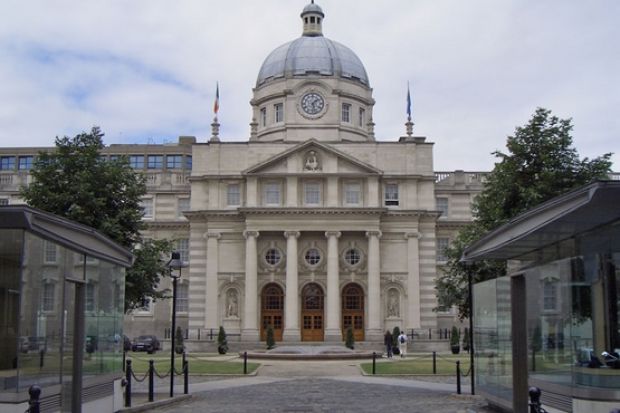Northern Ireland’s two universities will be able to participate in the Republic of Ireland’s flagship scientific research funding scheme under a new cross-border initiative.
The agreement to permit Queen’s University Belfast and the University of Ulster to participate in Science Foundation Ireland’s Investigators Programme was signed on 22 January by Stephen Farry, Northern Ireland’s employment and learning minister, and Richard Bruton, the Republic’s minister for jobs, enterprise and innovation.
The agreement – which comes with an £8.4million funding pledge from the Northern Ireland Executive - will apply specifically to collaborative projects involving universities from both jurisdictions; Northern Irish universities will remain unable to apply for awards in their own right.
Mr Farry said the initiative provided a “real opportunity to develop new cross-border research collaborations with the potential, in the longer term, to bring further success under Horizon 2020, the European Commission’s latest research framework programme and a major priority for both governments”.
Mr Bruton said: “Improving our research and development infrastructure is a key priority for both governments, and a key pillar upon which the Irish government’s Action Plan for Jobs is built.”
According to Science Foundation Ireland’s 2013 annual plan, the Investigators Programme, which launched in 2011, aims to support “the development of world class research capability and human capital in areas of science, engineering and mathematics that demonstrably support and underpin enterprise competitiveness and societal development in Ireland”.
Its remit is focused on 14 priority areas deemed to offer the greatest potential for creating wealth and employment in Ireland: mainly areas of technology such as food for health, marine renewable energy, medical devices and processing technologies.
This approach has proved controversial in the Republic of Ireland, with some academics carrying out basic research complaining of having been frozen out.
But Hugh McKenna, pro vice-chancellor for research and innovation at Ulster, was unconcerned by the restrictions.
“The areas highlighted as themes reflect well our own research strengths. Furthermore, we see this as only one of the funding streams we can access; currently we are also linking with the Republic of Ireland on other funding initiatives,” he said.
In a statement Queen’s says it will “seek to encourage applications where research collaboration already exists, and also where it fits with the strategic priorities of the university and the region”.
Mark Ferguson, director general of Science Foundation Ireland and chief scientific adviser to the Irish government, said: “The move towards building Ireland’s international reputation is linked heavily to partnerships such as this, which offer the scientific community in Ireland promising new opportunities.”




